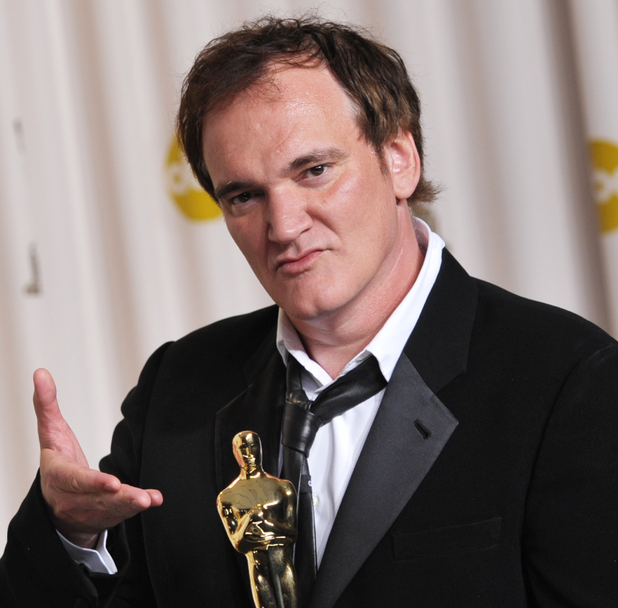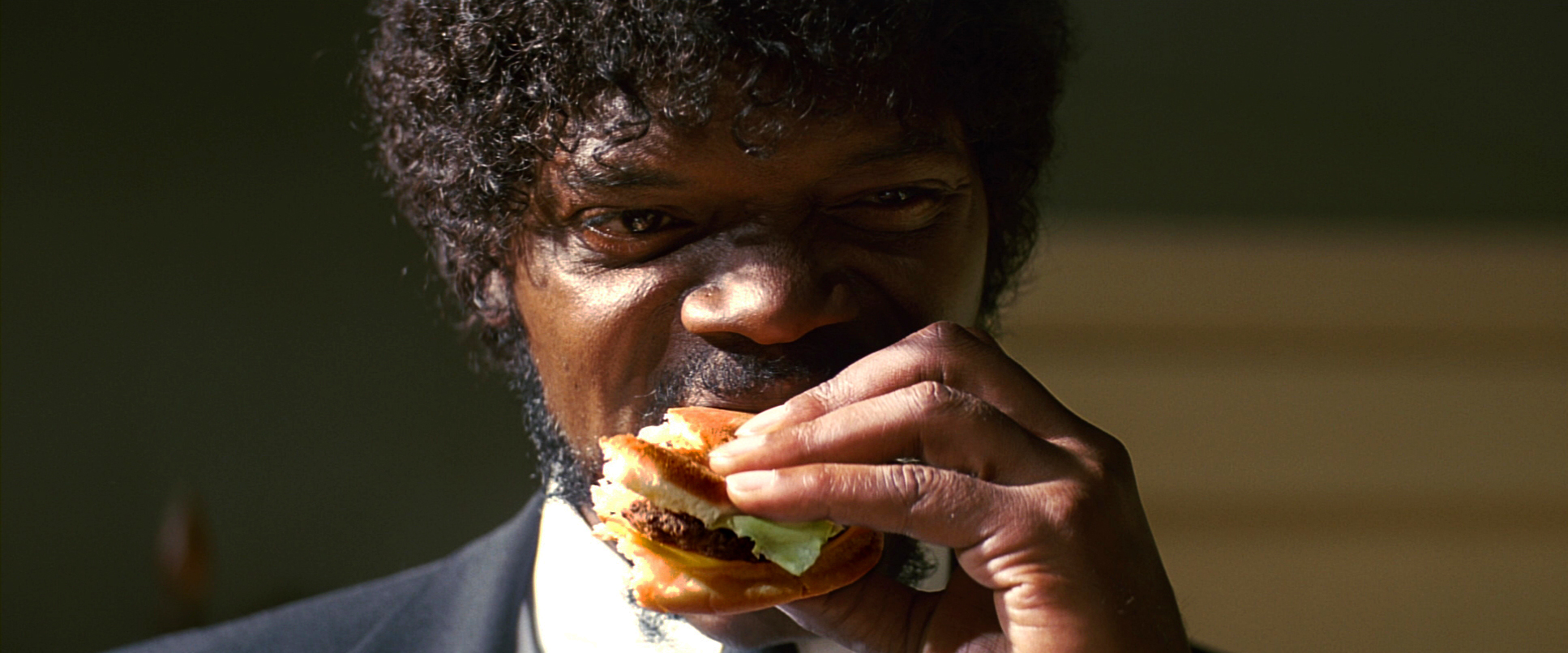Over the top, chaotic, dirty, yet wonderful
(This post contains spoilers)
A man who is described by some as being “morally empty” or a “Schlock and Awe merchant” whilst also described as having “etched his name onto the wall of great American filmmakers.” by others.
http://www.biography.com/people/quentin-tarantino-9502086 states that (much like many students!) Tarantino “grew up loving movies more than school”, eventually landing a job at the Video Archives in his early 20s. It was here that he began writing his first co-written script; My Best Friend’s Birthday, but yet to his own admission it was poorly directed and it was never officially released.
No, Quentin Tarantino’s break out was with the independent crime film 'Reservoir Dogs' 1992- a film depicting the stressful events after a heist-gone-wrong. The film gathered critical acclaim with moderate financial success. It was even named "Greatest Independent Film of all Time" by Empire magazine, earning $2,832,029 in the States whilst reaching for higher popularity in the UK, with £6.5 million. The film, now widely regarded as a classic and a 'cult hit' also garnered controversy in true Tarantino fashion. film critic Jami Bernard went so far as to compare the effect of Tarantino's film to that of the 1895 film L'Arrivée d'un Train en Gare de la Ciotat, in which audiences saw a moving train approaching the camera and scrambled in shock. Bernard claimed Reservoir Dog's was similar - in that the audience simply weren't ready.
Reservoir Dogs and the unnerving moments like the ear-cutting scene that came with it was just the beginning of Tarantino's now glittering career in directing. You see, Tarantino is one of the most experimental directors out there; blending together different genres and darting along the edge of what is acceptable yet delightfully entertaining in film with relative ease.
His next film was Pulp Fiction.
"so well-written in a scruffy, fanzine way that you want to rub noses in it—the noses of those zombie writers who take 'screenwriting' classes that teach them the formulas for 'hit films.' " - Roger Ebert
"It towers over the year's other movies as majestically and menacingly as a gang lord at a preschool. It dares Hollywood films to be this smart about going this far. If good directors accept Tarantino's implicit challenge, the movie theater could again be a great place to live in." - Richard Corliss
It's fair to say that Pulp Fiction went down well. A film so daringly different in nonlinear narrative writing style and directed in a highly stylized manner - it followed the intersecting story lines of multiple characters in a mix of dark comedic and crime genres. It's still to this date widely considered as one of the greatest films of all time.
With his use of what I would describe as 'cool violence', humor derived from the punchy dialogue and often shocking (in a good way!) writing, Tarantino proved he had the skill to direct a legendary film with many popular and high caliber actors and actresses.
Propelled by his newly found mass fame and fortune, Tarantino went on to create five other films, each of them reflecting various styles that we've (mostly) come to love from his first great pieces of work. The controversial violence, the immersing yet irrelevant conversations of the characters - none of which, we learn, are safe (example: Vincent Vega in Pulp Fiction).
Tarantino has even established recognizable traits for certain camera shots, scenes and themes, such as the mirror shot:
Making the audience feel captive too as they are forced to watch the scenes which make us feel the most squeamish
Yet he never delves too far from the very edge; something that some critics have qualms with. In nearly every Tarantino film, there has been torture scenes; there has been death; there has been violence be it with guns, knives or drugs; there has been racist language; there's even been alleged foot fetish hints. He's never far from being called out on such matters. Pulp Fiction was criticized by Kenneth Turan as he wrote, "The writer-director appears to be straining for his effects. Some sequences, especially one involving bondage harnesses and homosexual rape, have the uncomfortable feeling of creative desperation, of someone who's afraid of losing his reputation scrambling for any way to offend sensibilities."
Is Tarantino a 'Schlock and Awe merchant'? I don't know, I don't care, it's ruthlessly entertaining.
Reservoir Dogs and the unnerving moments like the ear-cutting scene that came with it was just the beginning of Tarantino's now glittering career in directing. You see, Tarantino is one of the most experimental directors out there; blending together different genres and darting along the edge of what is acceptable yet delightfully entertaining in film with relative ease.
His next film was Pulp Fiction.
"so well-written in a scruffy, fanzine way that you want to rub noses in it—the noses of those zombie writers who take 'screenwriting' classes that teach them the formulas for 'hit films.' " - Roger Ebert
"It towers over the year's other movies as majestically and menacingly as a gang lord at a preschool. It dares Hollywood films to be this smart about going this far. If good directors accept Tarantino's implicit challenge, the movie theater could again be a great place to live in." - Richard Corliss
It's fair to say that Pulp Fiction went down well. A film so daringly different in nonlinear narrative writing style and directed in a highly stylized manner - it followed the intersecting story lines of multiple characters in a mix of dark comedic and crime genres. It's still to this date widely considered as one of the greatest films of all time.
With his use of what I would describe as 'cool violence', humor derived from the punchy dialogue and often shocking (in a good way!) writing, Tarantino proved he had the skill to direct a legendary film with many popular and high caliber actors and actresses.
Propelled by his newly found mass fame and fortune, Tarantino went on to create five other films, each of them reflecting various styles that we've (mostly) come to love from his first great pieces of work. The controversial violence, the immersing yet irrelevant conversations of the characters - none of which, we learn, are safe (example: Vincent Vega in Pulp Fiction).
Tarantino has even established recognizable traits for certain camera shots, scenes and themes, such as the mirror shot:
Which might serve to add a sense of humanity to the characters in Tarantino's films, making them feel more realistic and emotional to the audience as they question themselves and reflect the intimate moments of being by yourself.
Or for another example, the torture scene:
Yet he never delves too far from the very edge; something that some critics have qualms with. In nearly every Tarantino film, there has been torture scenes; there has been death; there has been violence be it with guns, knives or drugs; there has been racist language; there's even been alleged foot fetish hints. He's never far from being called out on such matters. Pulp Fiction was criticized by Kenneth Turan as he wrote, "The writer-director appears to be straining for his effects. Some sequences, especially one involving bondage harnesses and homosexual rape, have the uncomfortable feeling of creative desperation, of someone who's afraid of losing his reputation scrambling for any way to offend sensibilities."
Is Tarantino a 'Schlock and Awe merchant'? I don't know, I don't care, it's ruthlessly entertaining.





No comments:
Post a Comment